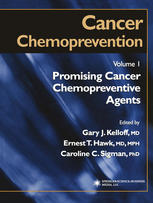

Most ebook files are in PDF format, so you can easily read them using various software such as Foxit Reader or directly on the Google Chrome browser.
Some ebook files are released by publishers in other formats such as .awz, .mobi, .epub, .fb2, etc. You may need to install specific software to read these formats on mobile/PC, such as Calibre.
Please read the tutorial at this link: https://ebookbell.com/faq
We offer FREE conversion to the popular formats you request; however, this may take some time. Therefore, right after payment, please email us, and we will try to provide the service as quickly as possible.
For some exceptional file formats or broken links (if any), please refrain from opening any disputes. Instead, email us first, and we will try to assist within a maximum of 6 hours.
EbookBell Team

0.0
0 reviewsMuch progress has been made in discovering and developing agents that have promise, or have already been successfully used, to treat precancerous conditions or inhibit carcinogenesis. In Cancer Chemoprevention, Volume 1: Promising Cancer Chemopreventive Agents, leading researchers in the discovery and development of chemopreventives comprehensively survey all aspects of these emerging therapeutics. For each agent, the authors review the relevant mechanisms of action, the criteria for populations benefiting from intervention, the safety and pharmacodynamics, clinical study design emphasizing the use of precancers, and early associated cellular and molecular biomarkers of carcinogenesis. The pharmacologic and/or mechanistic classes discussed range from antimutagens, antiinflammatories, and the nuclear receptor superfamily, to signal transduction modulators, antioxidants, vitamins, and minerals. The classes vary widely in terms of their stages of development as chemopreventives and include both extensively studied groups and those with recently identified potential based on such mechanistic data as protein kinase inhibition. Attention is also devoted to nutriceuticals (food-derived agents) because of their high promise for prevention in healthy populations. The overall focus is on molecular targets and mechanisms. A second volume, Strategies for Cancer Chemoprevention, describes the exciting methodologies that are accelerating progress in this field and discusses the state of clinical development of chemoprevention in the various human cancer target organs.
Up-to-date and highly practical, Cancer Chemoprevention, Volumes 1 & 2, offer oncologists, pharmacologists, medicinal chemists, and toxicologists a comprehensive reference survey on the identification of promising cancer chemopreventive agents that will help stimulate further research and the development of novel approvable drugs.